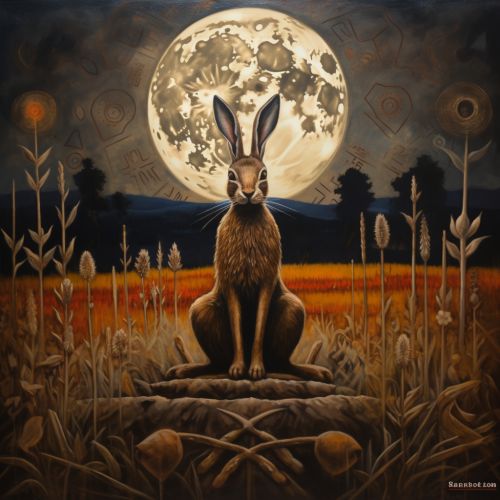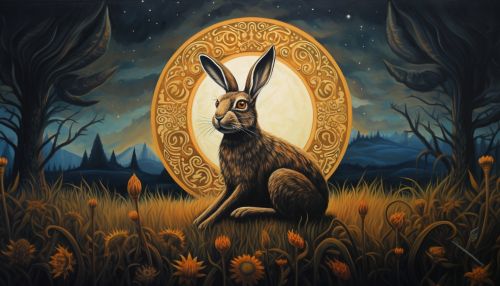Hare (mythology)
Overview
The Hare is a creature that has been deeply embedded in various cultures' mythologies and folklore around the world. Its symbolism and significance vary greatly from one culture to another, often representing contradictory traits such as fertility and chastity, cowardice and bravery, or life and death. This article explores the role of the hare in mythology, focusing on its representation in different cultures and the underlying meanings of these representations.


Ancient Egypt
In Ancient Egypt, the hare was associated with the concept of 'openings' and 'transformations'. The hieroglyph for a hare, pronounced 'wen', was used to represent the concepts of 'being' and 'existence'. The hare was also linked to the moon, as Egyptians believed that the markings on the moon resembled a hare, leading to the hare being associated with lunar deities.
Celtic Mythology
In Celtic mythology, the hare is a creature of significant importance. It is often associated with the moon, fertility, and rebirth. The hare was considered sacred to the goddess Eostre, who was celebrated during the spring equinox, a time of rebirth and renewal. The hare was also believed to have magical abilities, such as shape-shifting and the power to cross between the mortal and the fairy world.
Native American Folklore
In Native American folklore, the hare is often portrayed as a trickster figure. The hare, known as Manabozho or Nanabozho in various tribes, is a central character in many stories, often using cunning and deceit to outwit other creatures. Despite its trickster nature, the hare is also seen as a creator figure, responsible for shaping the world and bringing useful skills to humanity.
Japanese Mythology
In Japanese mythology, the hare is a central figure in the myth of the Moon Rabbit. According to the folklore, a hare sacrificed itself to feed a hungry traveler, who was actually a deity in disguise. Touched by the hare's selflessness, the deity resurrected the hare and placed it on the moon for all to see. This story is a popular subject in Japanese art and literature, symbolizing self-sacrifice and charity.
African Folklore
In various African folklores, the hare is often portrayed as a trickster, similar to its role in Native American folklore. The hare uses its wit and cunning to outsmart larger and stronger animals. These stories often serve as moral lessons, teaching the value of intelligence and resourcefulness over brute strength.
Conclusions
The hare is a creature that has been deeply embedded in human mythology and folklore, its representation varying greatly from one culture to another. Despite these differences, common themes emerge, such as the hare's association with the moon, fertility, rebirth, and trickery. These associations reflect the hare's behavior in the natural world, as well as human perceptions of this creature throughout history.
